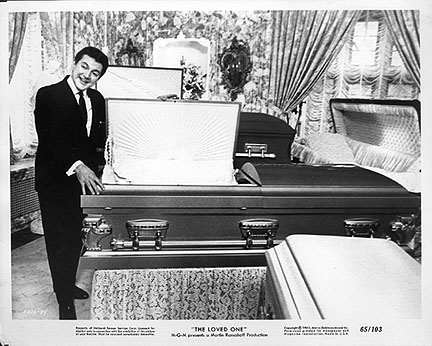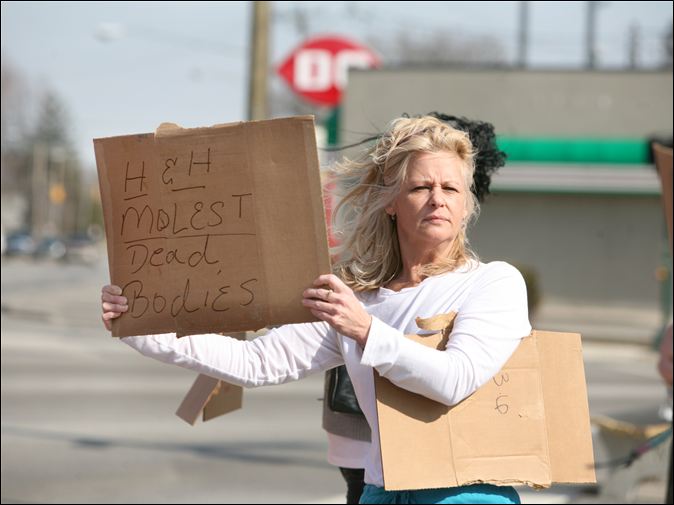Consumer Rights
When You Should Fire Your Funeral Home
Before I tell you when you should fire your funeral home, bear with me as I describe the situation that prompted this little blog post:
I traded in my convertible for a used sedan last week. We’re thinking about kid number two, so it was time for me to grow up and get something with four doors. After doing a bunch of research, I found a well priced used car on AutoTrader that was only about an hours drive away from Parkesburg.
Even though I consider myself a well-informed car buyer, I hate the car buying experience. Mainly because I hate used car salesman. If you’re in car sales or have ever been in car sales, I’m sorry. I would probably like you in any other life context other than when you’re trying to sell me on a car. Really, I hate the pressure. I know the pressure, the double talk, the various sales tactics are coming, and I role play how I’ll respond … but when the time comes to hammer out a deal … ermahgerd.
This particular used car dealership low balled my trade-in. And I fell for it. And now, a week removed, I’ve resigned myself to losing a couple thousand dollars.
When it comes to spending money my mind sometimes gets cloudy. I continually question myself … what are my motives for buying this? Is it really worth it? Are there any smarter buying options? On and on and on until I get brain paralysis and become slightly impulsive only to suffer through a week or two of buyers remorse immediately after my purchase.
Grief and pressure have similar effects upon a person’s decision making. The clouding. The impulsiveness. Factors that both funeral directors and car salesman can all too easily take advantage of if they so desire.
In fact, grief is, in many ways, similar to alcohol inebriation when it comes to decision making. You can’t and shouldn’t make big decisions when you’re grieving. Just as some legal contracts aren’t legally binding when one of the persons involved is drunk, so I’m not really sure that a funeral contract should be entirely binding when one of the persons is suffering from severe grief.
In its original 1975 study on the unethical practices of the funeral industry, the Federal Trade Commission wrote:
Each year, millions of families are forced by the death of a relative to make one of the largest consumer purchases under severe handicaps of time pressures, emotional distress and lack of information or experience. There are few, if any industries where the ultimate consumer is so disadvantages or where his normal bargaining power is so diluted in a situation of such immediate need.
(ON A SIDE NOTE: I can’t stress enough how important it is to think about dying and death BEFORE it takes place. Write a living will, write out your will, name a power of attorney, name an executor. If you can, make “prearrangements” with a funeral home well before you die, that way your loved ones aren’t confused about what you want; nor are they having to make funeral decisions in their confused and grief stricken state of mind when you die.)
When we meet with families, we recognize this “grief confused” state and we usually give families a preface before we sell them anything, especially a casket. When we go into the casket “showroom”, we preface it with something like this, “We aren’t salesmen. We want you to make an informed decision and we won’t push you in any direction.” In fact, we try to “down-sell” caskets instead of “up-sell” them. Simply put, the expensiveness and beauty of a casket has absolutely no correlation to the amount of love you have for the deceased. If you want to buy them something nice, that’s fine, but a pine box serves the purpose equally well.
If you EVER feel pressure from a funeral home or funeral director to buy something more expensive — or something you don’t want — FIRE THEM! Seriously, just fire them. Walk out if you need to. The fact is that your mind is already clouded by grief and the last thing you need in your life is something trying to squeeze money out of you … because they will. You just experienced a death in your life. You need people who love you, NOT people who want to exploit you.
Yes, firing a funeral director at this point in the game is like walking out midway through a haircut. But it can be done and it has been done. We’ve had a couple families who have fired their funeral home and call us. Thankfully, we’ve yet to be fired, although if the day comes, we’ll be understanding.
Firing someone can be awkward. But it’s worth it. You don’t need to be exploited in your grief.
Help Us, Social Media. You Are Our Only Hope.
 The funeral industry is too often known for its worst practitioners. The practitioners who take financial advantage of the bereaved in their most helpless state. Those who price gouge and exploit. Those who use the dark side of the Force.
The funeral industry is too often known for its worst practitioners. The practitioners who take financial advantage of the bereaved in their most helpless state. Those who price gouge and exploit. Those who use the dark side of the Force.
So how can you – the consumer – distinguish between the funeral homes that genuinely want to serve you and those that want to weasel their way into your wallet?
Some suggest that the distinction is as easy as corporate vs. family run, that corporate run funeral homes are the bad guys and family owned are suit wearing angels (i.e. Six Feet Under). And while it may be true that corporate tends to be more about the bottom line, the assumption that all family owned funeral homes are good is just plain FALSE. I’ve seen many family funeral directors that hide horns underneath their greased hair and will stop at nothing to “up sell” families into buying a more expensive funeral.
Years ago, Jessica Mitford with her “You may not be able to change the world, but at least you can embarrass the guilty” Jedi journalistic mantra managed to expose many a guilty funeral director. In her “American Way of Death”, Mitford wittingly embarrassed the abuses of the funeral industry in the 1960s and paved the way for the “Funeral Rule” in the early 1980s … the “Funeral Rule” that is meant “to protect consumers by requiring that they receive adequate information concerning the goods and services they may purchase from a funeral provider.”
The “Funeral Rule” externally demanded disclosure and transparency from the funeral industry. And yet, despite the “Funeral Rule” we are still seeing reports such as this:
In 2012, 23 of the 127 funeral homes, or about 18%, that the FTC visited undercover “significantly violated” the federal agency’s Funeral Rule, a 1984 law that requires funeral homes to give consumers itemized price lists, prohibits them from requiring the purchase of certain items like caskets as a condition to get other products and services, and bars aggressive selling of services not required by law, like embalming.
FOR THE SAKE OF THE CUSTOMER, HOW CAN THE GOOD, HONEST FUNERAL HOMES DISTINGUISH OURSELVES FROM THESE BAD FUNERAL HOMES?
Let’s be clear. Secrecy in this industry is the cloak for criminality. Just as the dark side feeds off emotions of anger, so the “bad” funeral directors feed off closed doors The funeral industry needed Jessica Mitford. And it’s a shame that someone had to come in from the outside to expose us.
Today, with the transparency of social media, the GOOD, honest funeral homes can disclose ourselves from the inside out. I’m not talking about a funeral home having a website. I’m talking about a funeral home having a blog, a facebook page, a twitter account, etc … a forum that invites feedback, that invites questions, criticism and praise … from you, our customers. I’m talking about voluntarily disclosing ourselves to the world. Fighting the dark side with the lightsaber of transparency.
Through the communication space afforded by the web, funeral directors can open the doors to the public. We reveal those places and practices that were previously held in secrecy. We take off the tie and let the public see the man and woman behind the suit. We create an environment where the consumer is NOT afraid to ask questions. We educate the consumer about their burial options. We explain to the consumer the laws that protect them. We set price standards. We tear down the veil of secrecy and the shroud of feigned “professionalism.”
The internet and the transparency it affords is a friend to the good funeral home. It’s an enemy for those funeral homes that have practices they’d rather hide. Simply put: If you want to hide, you stay away from opening yourself up on the web ’cause the web will eat you up with it’s questions and it’s brutal honesty. If you don’t have anything to hide, the web will (for the most part) love you. If we make transparency the industry standard, those who can’t be transparent will slowly (and sometimes suddenly) lose their business.
And that’s part of my goal at Confessions of a Funeral Director. The more I tell consumers about the industry, the more educated they become, the easier they’ll be able find us good guys. Empower the people.
And it’s those good funeral directors that need to take full advantage of social media outlets. Educate. Empower. Disclose. Accept the questions. The vulnerability. And by doing so you’ll create a group of consumers who will — on their own — be able to distinguish between the good guys and the bad guys. Secrecy is friend to the bad funeral homes. While social is friend to the good.
With transparency and social media, we can slowly set a new industry standard. And you, the consumer … the ones we want to serve … will be better off for it.
Use the force, my friends.
Do Funeral Homes Charge Too Much for Their Services?
Do Funeral Homes Charge Too Much for Their Services?
I asked this question on my Facebook page over the weekend. Over 330 people answered. And the discussion became pretty heated. Being that I like hot topics, I thought I’d take a stab at the question.
Let me preface this article by saying that I am not an economist, nor am I an exceptional business man. The following are ten observations that are a combination of experience in the funeral industry and my heart felt intention to meet the needs of the people I serve – needs that often include an economical funeral.
One. Yes, there are bad guys (and bad corporations) in the funeral industry. Legit racketeers.
Two. Yes, there are good guys.
Funeral directors who are more concerned with helping you through the funeral process than with making money. There’s probably more good guys than bad guys. We’re out there. Find us.
Three. Shifting Cultural Attitude towards Death
The industrialization of dying has removed the dying of our loved ones from home care. The institutionalization of dying means that you will probably die in an institutional setting (hospitals, nursing homes), where “professionals” treat the body while (often) ignoring social and spiritual aspects of dying. In fact, three out of four deaths in the United States occur in a hospital or nursing home, outside of our home surrounding and outside of the comfort of our family.
The professionalization of death has removed death from home and family. The Amish hire the funeral director to embalm the body and produce the legal paper work, but they do the rest. They dress the body, they casket the body, they have the funeral at their home and they direct the funeral service. There’s something to be said about one’s caretakers in life also being one’s caretakers in death.
With the industrialization and professionalization of death and dying, we have had the responsibility taken away from the community, and without that responsibility, without that personal investment in dying and death, we no longer see the full value of funeralization.
 Four. Jessica Mitford and the Public Perception.
Four. Jessica Mitford and the Public Perception.
“You may not be able to change the world, but at least you can embarrass the guilty”, said Mitford. In Stephen Colbert-esque fashion, Mitford’s “The American Way of Death” wittingly embarrassed the abuses of the funeral industry in the 1960s and paved the way for the “Funeral Rule” in the early 1980s.
The “Funeral Rule” is meant “to protect consumers by requiring that they receive adequate information concerning the goods and services they may purchase from a funeral provider.”[1] And while some of the abuses in the funeral industry have been quelled by the Funeral Rule, the depiction of funeral directors as “oleaginous salesman pushing me to buy a mink-lined steel casket with an Eternal Memory Foam pillow fringed in Flemish crepe and gently scented with lilac”[2] has – to one degree or another – remained in the public perception.
On the one hand, it’s important to recognize that Mitford’s criticisms were – and, in some cases, are — warranted; on the other hand, it’s important to recognize that Mitford viewed the funeral industry through the lens of economics and class. She seemed to believe that the funeral industry was based on a desire to assert one’s standing in society. Why else would you spend a couple grand on a funeral, unless you were attempting to distinguish yourself from others? And funeral directors capitalized on this desire to brag in death. In your moment of intense weakness, we play on your pride and reach into your wallet. So, of course we are overcharging … at least, that’s part of the public perception.
Five. Value.
And this leads us to the value of a funeral. In a capitalist market, value is determined by the market … by you. If you value it, you’ll pay for it. And seeing value in a funeral is the real question. It’s not, “Do funeral homes charge too much?”; rather, its, “Is there real value in funerals?” Once we answer the value question, then we can answer the cost question.
If you don’t see value in what a funeral home is offering you, find one that offers you the product and services that you do value.
If you don’t see value in the products that the industry is offering you, demand different products and service.
If we do indeed charge too much, it’s because the market doesn’t see value in what we’re offering.
Six. Trust.
The funeral home that is geographically closest to us charges roughly two grand more per funeral than our funeral home. We know some of the people they bury and – because it’s generally known that our funeral home is rather inexpensive – I often wonder, “Why do they go to Such-and-such Funeral Home when we’re less expensive?” My conclusion? Trust. They have a better relationship with that funeral director than they do with us.
Because we recognize that death has altered our reasoning, when someone dies and we have to make arrangements, we want to go to somebody we trust … and, if possible, someone we already know. In our transient society, there’s situations where we have not connections to funeral directors / funeral homes.
But, when there is trust with a funeral director, when there is a relationship with a funeral director, especially during times of death, money isn’t as much of a consideration. The value of trust usually outweighs the cost.
Seven. Non-profit vs. for profit.
I think there’s an expectation for us to be a non-profit organization. To be a ministry. But, if we were a non-profit ministry, there’d simply be less consumer options. It would be governed by a board, the products would be determined by donors and the service might be even more cookie cutter than it already is.
There are options. You should be able to find a funeral home that offers a direct cremation for under $2,000. You don’t have to be embalmed. There are cemeteries that don’t require vaults. There are inexpensive caskets.
You can die at home. You can be more involved in the death process. In 1996 Jessica Mitford was buried for $533.31. With inflation rates factored in, you can purchase the equivalent of Mitford’s funeral today.
Nine. Prepaying / Insurance Policies.
It’s always much more difficult to handle the expenses of a funeral when you have to pay it all at once. Think buying a car with cash. Not all of us can do it.
If you plan ahead, or buy an insurance policy, you can pay in increments and when the time comes it’s not as much of a shock.
Ten. Pre-planning: Now is the Time to Think about Death.
We plan for weddings. We plan for births. Think about your dying and death now. Think about what you want. Think about how you want your funeral to look. Find a funeral director who can meet your needs
[1] http://en.wikipedia.org/wiki/Funeral_Rule
[2] http://www.patheos.com/blogs/godandthemachine/2013/06/finaljourney/
Consumer Advice from The Funeral Home Abuse Attorney
“I was pretty certain it wasn’t my wife – unless she did some awful changing,” said Evans Davidson, the bereaved widower whose wife’s body was in a funeral body mix-up at the Simpson Mortuary in Inglewood, CA. Unfortunately, mistakes and negligence like body mix-ups happen in the funeral business. And when they do, there are lawyers like Farid Yaghoubtil who can help in reparations.
Here’s some legal advice from Farid, which is valuable for both the funeral consumer as well as the funeral director:
*****
Funeral home abuse is common in today in the U.S., however victims are often not aware of their rights. In fact much of the information published regarding funeral home negligence does not discuss the important issues. Family member of the deceased have a claim for the significant emotional and psychological distress caused by dealing with such an event. Court and juries also recognize the impact such actions can have on the families in an already difficult and stressful time. If you are the victim of a any type of funeral home abuse read the following article outlining your rights.
Funeral Home Negligence Liability
Negligence is defined as a sub-standard level of care. When the funeral home fails to render appropriate service you will have standing to bring a cause of action for negligence. In most cases proving negligence is not a challenging issue. However, proving whether you have standing to sue is. standing is required in any cause of action. It essentially means that you are in a position to bring forth a lawsuit for your injuries. The paragraph below outlines some of the basic elements of who can sue or who has standing to sue in funeral negligence cases.
A funeral home will be found negligent when they failed to conduct services for which they were contracted for. This can include improper burial in accordance with the family’s wishes, negligent embalmment and more. In certain cases funeral homes will mishandle a body entirely. This will include swapping or misplacing the deceased body entirely.
In cases where the wrong body was given for burial the family will be able to pursue a claim for their injuries. Injuries can include serious emotional distress, which can manifest into physical ailments.
If it can be proven that the actions of the funeral home were intentional, punitive damages are also possible. Intent can also be proven through gross negligence in certain circumstances. With intent punitive damages are possible. Punitive damages allow for enhanced damages and serve to punish the defendant for their actions. In certain cases punitive damages have been allowed.
Who Can Sue for Damages?
Courts permit recovery for funeral home negligence to a certain class of family members. Potential plaintiffs include those who the funeral home owe a duty to. This includes family members who had knowledge of the services being performed.
Section 7100 of the business and professions code specifically points out who is permitted to bring a cause of action for damages. According to this section the following parties are permitted to bring forth a cause of action, they include:
– Surviving spouse;
– Any surviving child or any children of the now deceased party;
– Surviving parent or parents of the now deceased party;
– Those permitted or names in the order of succession who are entitled to the estate of the deceased; or
– Public administrators when the deceased has enough assets.
In certain cases courts have restricted the recovery to only those persons who can establish a direct link between the conduct and emotional distress. Courts have reasoned that in order to avoid the wholesale filing of lawsuits against funeral homes there must be a identified group of parties who can bring a cause of action.
It is also important to mention that there must be some type of emotional or physical manifestation with regards to your injuries. You must have some type of emotional, psychological or physical harm suffered as a result of the funeral home negligence. This injury can manifest itself in a number of different way. When considering to file a lawsuit you should speak with your attorney about any therapy or counseling you may required or are seeking.
Witnessing a deceased loved ones remains being mishandled is a traumatic experience for anyone. It can have long lasting impacts on the mental wellbeing of the witnessing party. Feelings of distress, anxiety, PTSD are all possible and can be amplified depending on your relationship with the deceased party.
While not all parties can move forward on a claim it is important to get your case evaluated. There are often many statutory filing timelines which need to be addressed.
Types of Funeral Abuse Cases
There are countless acts which can be considered funeral home abuse or neglect. This is not an entire list, if you feel that there was abuse, we strongly suggest you have your case evaluated.
– Removal of bodily remain- this is considered a felony in certain jurisdictions
– Sexual assault of the deceased
– Negligent entrustment
– Negligent embalmment
– Mismatching or incorrectly burying the wrong body at a funeral
– Loss of remains
– Loss of the body at time of the funeral
– Misconduct done in private by funeral home
– Mishandling of remains
Each of these cases requires careful evaluation of the facts. If you are interested in bringing forth a lawsuit for injuries, it is important you communicate this intent with your family. Often times it will make sense to include all parties who were there are the service in any suit you decide to bring. These issues will be discussed with your attorney.
Steps to Take in Funeral Negligence Cases
If after reading this article you feel you may have a case, follow these important steps to prepare for your case.
First, prepare the names of all family members who may be interested in pursuing a case. Remember not all parties are permitted to file a lawsuit, but it is advisable that you collect the names of all persons present at the time of the service.
Second, make absolutely no statement to any insurance company. Often times these statements can be harmful to your claim. Even if the funeral home is offering a settlement, speak with an attorney. If you decide to settle make sure it is a viable offer. Insurance companies will often short change or low ball you with their offers.
Third, speak with a personal injury attorney regarding your case. Downtown L.A. Law Group offers free consultations on all cases without charge to you. If we decide to accept your case, it will be done on a contingency fee basis. Our no win no fee guarantee assure that unless we are successful you will owe absolutely nothing in fees.
*****
 1. Law Firm Website: http://downtownlalaw.
1. Law Firm Website: http://downtownlalaw.Farid Yaghoubtil is a senior partner at Downtown L.A. Law Group, handling many types of litigation matters. He can be reached via e-mail at farid@downtownlalaw.com




